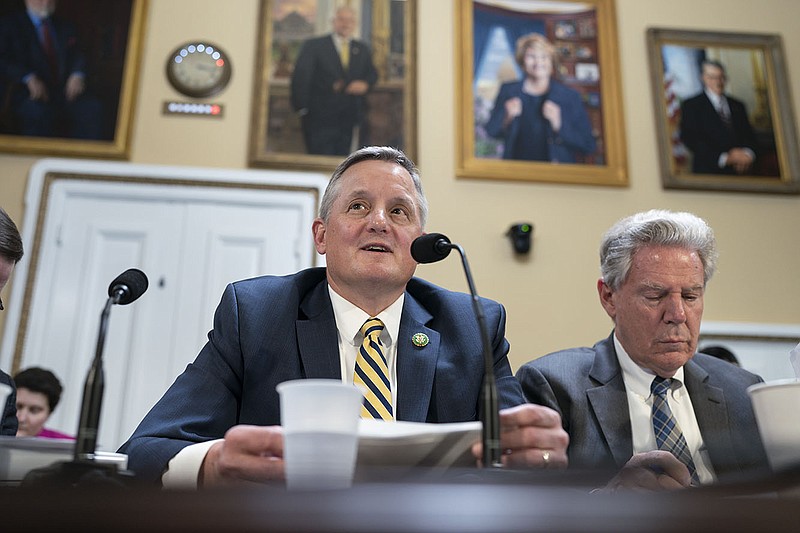WASHINGTON -- Even before the U.S. House of Representatives passed its sweeping energy bill earlier this spring, lawmakers knew the proposal was -- as Senate Majority Leader Charles Schumer, D-N.Y., put it -- "dead on arrival" in Congress' upper chamber.
House Republicans, who control their respective chamber, approved a proposal directed at increasing domestic energy production and streamlining permitting for projects. While lawmakers from both parties have shared interest in an energy package, Democrats asserted House Resolution 1 -- the Lower Energy Costs Act -- catered to fossil fuel companies by rolling back environmental regulations.
Despite the political divide, there are opportunities for lawmakers to pass energy legislation during this Congress. Senators have introduced multiple permitting measures in recent weeks, and lawmakers have talked about getting a bill to President Joe Biden's desk.
Arkansas Rep. Bruce Westerman is among those participating in the discussions. The Republican from Hot Springs serves as House Natural Resources Committee chairman and played an instrumental role in assembling the House's energy package.
"There's a lot of bipartisan desire to see permitting reform happen," Westerman told the Arkansas Democrat-Gazette.
As it relates to permitting, the Lower Energy Costs Act would make changes to the National Environmental Policy Act, a 1970 law mandating reviews of projects' environmental impact. The House bill would narrow the scope of such reviews and establish shorter deadlines for completing assessments.
The legislation also sets a 120-day window for filing litigation on agency decisions concerning energy and mining projects.
The House voted 225-204 on March 30 to pass the Lower Energy Costs Act. Four Democrats joined all but one Republican lawmaker in support of its passage.
"We did our job," Westerman said. "The Senate has that. The ball, again, is in their court to either take up HR 1 or pass their own bills and the House and the Senate come together."
Westerman has spoken to several lawmakers about passing permitting legislation, including West Virginia Sens. Joe Manchin and Shelley Moore Capito.
"Bruce is a good person to work with," Manchin, a centrist Democrat, told the Democrat-Gazette. "We all want the same thing. We know we've got to make changes, and I've been pushing that from day one."
Manchin and Capito have introduced separate measures this month directed at reducing the timelines of National Environmental Policy Act reviews. The proposal from Capito, a Republican, would additionally establish a narrow definition of "waters of the United States," which federal agencies use for regulating certain bodies of water. The future of this water regulation is uncertain due to multiple legal challenges, including a U.S. Supreme Court case with opinions to be released in the coming weeks.
During a Senate Environment and Public Works Committee hearing Wednesday, Capito -- the committee's top Republican -- expressed frustration concerning hurdles and court battles hindering projects.
"We have tried for years in prior infrastructure laws to solve these problems with increased coordination and aspirational timelines, but as we sit here today the problems persist and these solutions have not worked," she said. "That is why we need specific legislation."
Sen. John Boozman, an Arkansas Republican from Rogers, is among the co-sponsors of Capito's legislation. Boozman serves alongside Capito on the Senate Environment and Public Works Committee.
Manchin, chairman of the Senate Energy and Natural Resources Committee, and Capito pushed permitting legislation during the last Congress. Manchin's effort was part of an agreement involving Democratic leaders and first consideration of the Inflation Reduction Act. Senators last December rejected an effort to include a permitting bill in Congress' annual defense authorization legislation.
"I knew everybody wanted to do something. It was just caught in politics," Manchin said.
Sen. John Barrasso, R-Wyoming, who serves under Manchin on the Senate Energy and Natural Resources Committee, has introduced his own measure aimed at expediting the permitting process. Sen. Tom Carper, D-Delaware, who leads the Senate Environment and Public Works Committee, introduced a discussion draft of permitting legislation Thursday.
"The process would be for them [the Senate] to pass a bill -- if they don't like HR 1 -- and then the House and the Senate go to conference and come away with some good permitting reforms and good energy reforms," Westerman said.
"Eventually, I think there will be meetings with Barrasso, Capito, Carper and Manchin and myself and others to try to work some of this out."
Westerman is optimistic about Congress passing a permitting measure, but he recognizes any result will require compromise. He said Republicans want a deal that addresses the National Environmental Policy Act and protects efforts to extract domestic fossil fuel resources.
"It's going to be a give and take," he said regarding potential negotiations. "That's really how Congress should work, and I hope the process works."
Legislators could approve permitting changes as part of a debt ceiling agreement. House Republicans inserted the Lower Energy Costs Act into their plan. The White House and congressional leaders are trying to pass a plan by June 1 to ensure the United States does not default on its financial obligations.
Westerman did not advocate for including the energy package in the House debt ceiling plan. He previously told the Democrat-Gazette he backed Republican colleagues who supported the insertion.
Manchin said he "would love" for the final debt ceiling proposal to include language on permitting. If not, the senator said he believes Congress can pass related legislation before legislators take a one-month recess this summer.
"The goal is no later than August, and the aspiration is let's put it on the debt ceiling and get it done now," he said.
